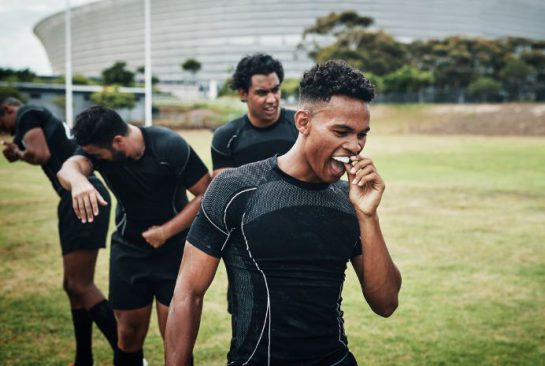- SHOWCASE

Sports Dentistry and Mouthguards
Sports dentistry focuses not just on the treatment of sports-related dental injuries but also aims to prevent damage to the teeth and gums by preventing or limiting the damage caused by sporting accidents.
Although it may appear that only adolescents and young people can be the victim of a sporting dental injury, this is far from being the case. Millions of people across the globe partake in many sports –and many of these people are well into adulthood and even pensioners are also more active.
Prevention is always better than cure and protecting the mouth from unwanted accidents goes a long way to preserving a confident smile. This is easier to achieve than may be imagined — as many dental disasters can easily be avoided, or the damage kept to a minimum, with the use of properly fitted mouthguards.
Prevention
There is a range of safety and protective equipment available today that never existed a few short decades ago. Helmets, face guards, padding, support braces and other sports gear is now commonplace across many sports and there can be no doubt that these modern devices have greatly reduced the physical risks involved in sporting activities.
Among the most common sporting injuries are blows to the face, head and neck and protecting this vulnerable area is of the utmost importance. Even the slightest blow to the face can impact on the teeth leaving them cracked, broken or even missing. Wearing a mouthguard will not guarantee that the teeth will never be damaged, but it will dramatically reduce the possible damage.
Mouthguards do not just offer protection for the mouth but they also:
Help support and stabilize the temporomandibular joint (TMJ) which connects the jaw to the skull
Prevent injury to the TMJ
Reduce possible damage to the lips and gums
The effectiveness of mouthguards in protecting against serious dental damage has long been accepted as fact by the American NFHSA (National Federation of High School Athletics) and their use is now required for many school sports including football, lacrosse and hockey.
Types of Mouthguards
There are two types of mouthguards available, but only one is really worthwhile investing in. The choice lies between:
- Store-bought boil-and-bite
- Custom-fitted
Boil and Bite. Often referred to as “boil and bite”, a store-bought mouthguard is the cheapest option but far from being an ideal solution. Made from a thermoplastic, boil and bite mouthguards are heated until soft and then formed into a mold when bitten into. These are generally poorly fitting and perform only the most basic function of offering some protection to the mouth.
Custom-fitted. These are created by a dentist or dental technician and are perfectly fitted to an individual’s teeth. Fabricated from a personal dental cast, and usually made from acrylic compounds, custom-fitted mouthguards employ a hard outer shell for maximum protection and a soft inner casing for comfort.
A snug (but comfortable) fit is required to achieve the best outcome and a custom-fitted mouthguard provides this as well as making breathing and speaking easier than is often the case with the boil-and-bite variety.
Importance of a Mouthguard
Even the most minor sports injury to the teeth or gums can be a long-term issue and costly to remedy. Despite taking the greatest care possible it is highly probable that most people will suffer a head or facial injury at some point in time if regularly partaking in sporting activities.
Minimizing the risk, and the possible damage, is not only sensible but can also avoid unwanted recovery time and unnecessary expensive treatment. Mouthguards are relatively inexpensive considering the level of protection they provide and choosing not to wear one during sports is a foolish mistake.
Regardless of the type of sport being played or the level of physical contact, accidents will happen — and dentists are frequently called upon to treat sports-related dental issues including:
Chipped, cracked or broken teeth
Bitten inner cheeks or tongue
Bruised or cut gums
Dislodged crowns, fillings and veneers
Trauma to the temporomandibular joint
These are not the only dental issues that may arise. A collision or knock while playing sports can also lead to damage to oral appliances such as dentures, bridges and replacement teeth.
Immediate Attention
Any sporting injury should be treated immediately to avoid exacerbating any damage done and this is particularly true of injuries to the head, face, neck and throat. A blow to the head can cause concussion (however mild) and damage to the neck or throat can have serious repercussions further down the line.
In the case of an accident or collision, sporting activity should be stopped immediately until medical attention is received. In the case of a dental injury there are steps that may be taken to limit any damage caused such as pressing a loose tooth back into its socket which will stimulate blood flow in the gum tissue.
Leaving any oral injury unseen to and untreated is inadvisable as there is always a risk of possible infection even if the damage is so minor as to be invisible.
Damage caused may worsen over time if left untreated and this can lead to serious dental disorders such as malocclusion (misalignment) and even disorders of the jaw.
Seeking immediate dental attention, even if there is no noticeable problem, is the wisest and safest course of action and simply ignoring a possible problem will not make it magically disappear.
Preserving the teeth and gums in the best possible shape should be the goal of everybody regardless of age and realizing that a custom-fitted fitted mouthguard is the best way of doing so not only makes sense but is also a genuine reason to carry on playing sport with a smile!







